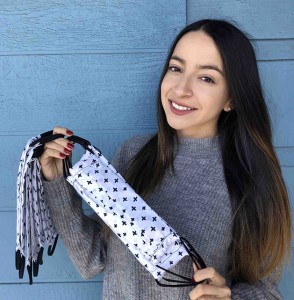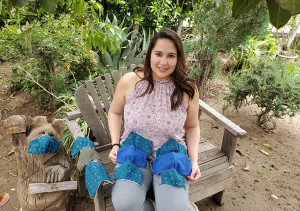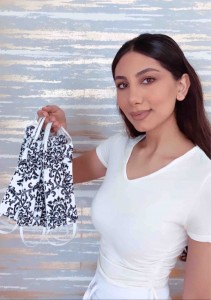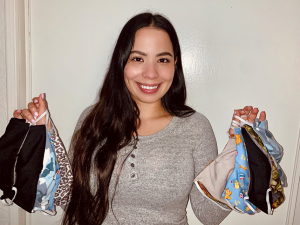The Fabric of Community: Health Administration Students Sew Masks for Front-Line Workers
In early March, a nurse from a San Fernando Valley hospital paid a virtual visit to CSUN professor Carmen Saunders-Russell’s health administration class to discuss how professionals from differing backgrounds must work together to help fight COVID-19.
Any little thing could help, she said — even something as simple as a health care administrator dropping in to ask: “Do you need help?”
The CSUN students responded, asking the nurse: What could they do to help?
“We need personal protective equipment,” the nurse said, referencing the crucial equipment news reports refer to as PPEs. “We need masks.”

Kathy Perez.
Saunders-Russell recounted that story this month, noting that the comment inspired her students to get to work. Approximately 30 students are each sewing at least 10 masks — some of them many more — to donate to health care facilities throughout Los Angeles. In all, hundreds of student-made masks have been earmarked for medical facilities throughout Southern California, including in the San Fernando and Antelope valleys, as well as the Million Mask Challenge volunteer drive.
Health care workers across the country are facing shortages of various types of masks and other PPE. Many are turning to homemade masks and other forms of protection. Community members across the country are stepping up to sew more masks, which depending on the pattern and materials used can fill in for various types of PPE.
Health care providers have been sending the students letters of gratitude for the donated masks.
“These items will help keep our front-line physicians, nurses and staff safe during the COVID-19 pandemic,” read a letter from one facility sent to thank CSUN student Cecily Manahane.

Diana Sanchez.
The project also solved a problem for Saunders-Russell and her students: The class, which is in the College of Health and Human Development connected to the CSUN Office of Community Engagement, requires a service-learning component. But with Los Angeles residents ordered to stay at home as much as possible, most service-learning opportunities disappeared.
Making masks was something tangible and essential they could do at home.
“That’s what our students are about,” Saunders-Russell said. “These are the real-life situations that they’ve been placed in, and this project helps them feel of service because that’s what we do in health care.”
Kathy Perez was the first student to start making masks, getting to work right away. The first mask was a little difficult, she said — her sewing machine wasn’t working correctly, and it took her five hours to do the first one. Soon, her mom jumped in to help troubleshoot and fix the machine, and Perez got the hang of it.
She used pillowcases for her mask material and hair ties for the elastic. She searched YouTube for simple patterns.

Mariam Kalantaryan.
While working on her project, Perez spoke with a neighbor, a pediatric nurse at a Los Angeles health clinic. The nurse said her facility could use the masks, and Perez agreed to donate them. Since then, she has made about 35, donating some to medical facilities and others to friends and family.
“These health care workers are putting their lives at risk for us, for everyone in the public, and the least we can do is find a way to help them,” Perez said.
Once Perez showed off her masks to the her classmates on Zoom, nearly every student decided to choose this option for their service-learning project. The class even stayed late after a session to exchange tips for sewing and facilities that were accepting mask donations.

Edith Polino.
The students continue to sew and send Saunders-Russell photos of their progress. Saunders-Russell even began sewing masks to donate to friends in the health care profession as well as to her husband, who trains bus drivers for Los Angeles Metro.
“This is important,” Saunders-Russell said. “It’s the actual act of service that I wanted them to learn. It’s the putting in your time and energy to help.”
Community members who want to help by sewing masks should find no shortage of facilities in need, Saunders-Russell said. She recommend options such as senior living facilities and the Kaiser Permanente Playa Vista Medical Office.

 experience
experience